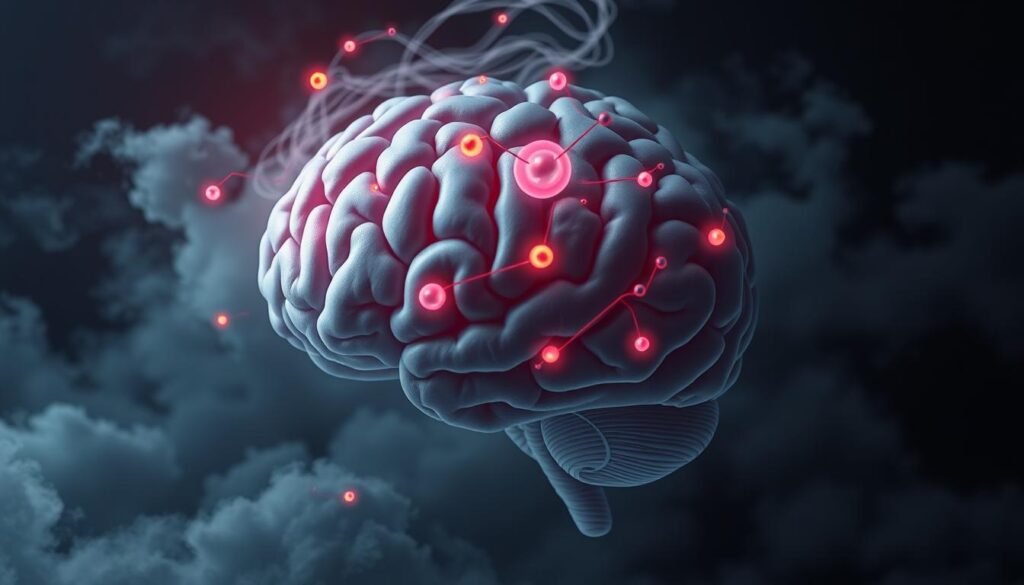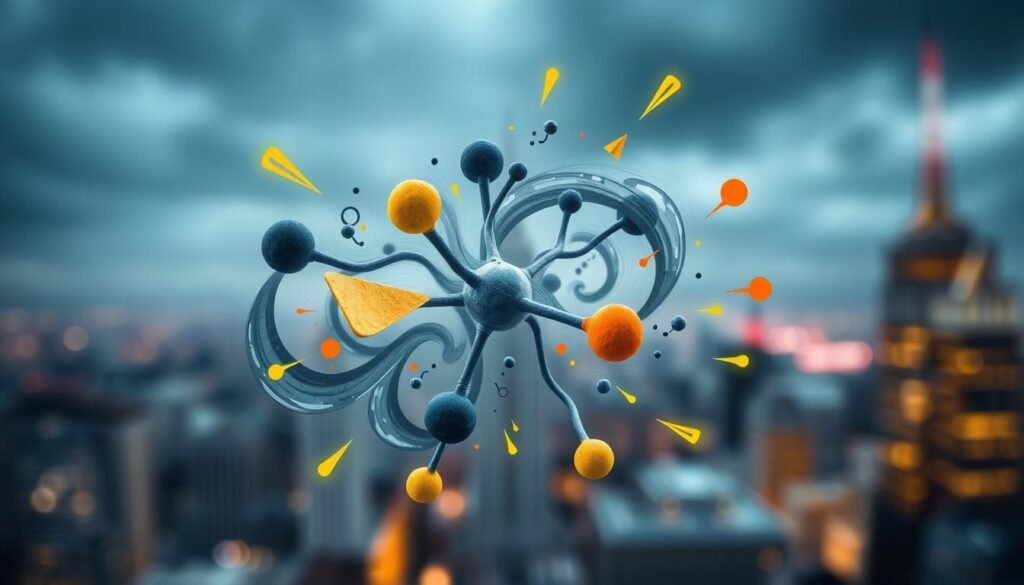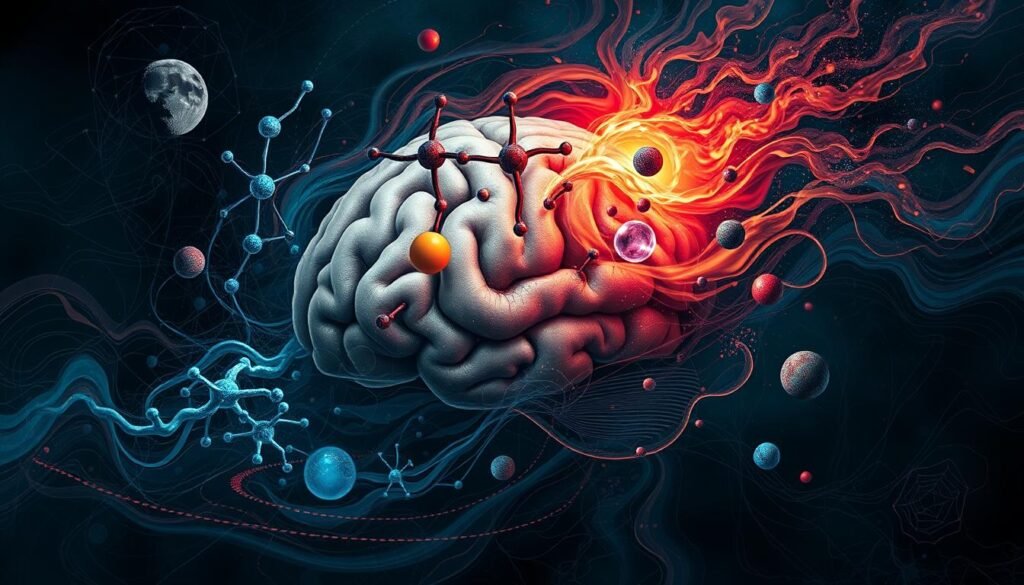Did you know that 85% of people think chemical imbalances likely cause depression? However, a study in 2023 found little proof of this. It showed that traumatic events in life are closely linked to depression. This reveals the complex roots of mood disorders.
We will delve into neurotransmitters and their roles. This includes serotonin, dopamine, and norepinephrine. Understanding these chemicals helps us see their effects on depression. It also shows how they influence our mood and mental health.
Key Takeaways
- 85% of people believe chemical imbalances cause depression.
- Research suggests traumatic life events significantly contribute to depression.
- Dopamine and norepinephrine are critical in mood regulation.
- Serotonin has been central in research on mood disorders for decades.
- The catecholamine hypothesis indicates norepinephrine levels may lead to depressive symptoms.
Introduction to Depression and Neurotransmitters
Depression affects millions worldwide. It’s complex, involving many factors. At its core is the neurotransmitter role in mood disorders.
Neurotransmitters are key to our mood and behavior. Serotonin, norepinephrine, and dopamine are crucial in depression. Their levels affect our mood, energy, and mental state. Low levels of serotonin and norepinephrine, for instance, may cause feelings of sadness, changes in appetite, and poor sleep.
The view of depression has changed over time. It went from being seen as a single cause issue to a complex one. Now, it’s understood through the biopsychosocial model. This approach looks at biological, psychological, and environmental factors.
Today’s treatments focus on boosting neurotransmitter levels. This aids emotional health and recovery. SSRIs, for example, are used to manage serotonin levels.
A good diet also supports emotional health. Foods rich in omega-3s and antioxidants help. They boost neurotransmitter production and stabilize mood. For tips on diet and mood, check out mindful eating practices.
Understanding depression’s deep nature helps in treatment. Knowing the role of neurotransmitters is crucial. This knowledge is key to better mental health for those affected.
Understanding Neurotransmitters in the Brain
Neurotransmitters in the brain are key chemical messengers. They help nerve cells talk to each other. At least 100 neurotransmitters have been found, and scientists believe there could be more.
Serotonin, dopamine, and norepinephrine are important for mood and emotions. Serotonin is known as the “feel-good” chemical. It affects mood, sleep, and anxiety. An imbalance can lead to depression and other disorders. Learn more about brain chemistry and.
Dopamine is part of the body’s reward system. It helps with focus, memory, and motivation. Problems with dopamine can lead to schizophrenia and bipolar disorder. Norepinephrine is crucial for attention and reaction, influencing mood as well.
The interplay of neurotransmitters affects brain chemistry and depression. Glutamate is a key excitatory neurotransmitter, whereas GABA is the main inhibitory one. Their balance is crucial. Imbalances may cause Alzheimer’s disease, insomnia, anxiety, and seizures.
| Neurotransmitter | Function | Associated Conditions |
|---|---|---|
| Serotonin | Mood regulation, sleep, and appetite | Depression, anxiety, seasonal affective disorder |
| Dopamine | Reward system, focus, and motivation | Schizophrenia, Parkinson’s disease, ADHD |
| Norepinephrine | Attention and response actions | Mood disorders, anxiety, depression |
| Glutamate | Excitatory signaling | Alzheimer’s disease, seizures |
| GABA | Inhibitory signaling | Anxiety, depression, irritability |
Understanding these neurotransmitters is key to knowing how the brain works. It shows us how brain chemistry connects to mood issues.
Which Neurotransmitter Is Low in Depression?
Research has found that certain neurotransmitters play key roles in depression. Serotonin, dopamine, and norepinephrine are notably important. Changes in these chemicals can lead to feelings of depression.
Connection Between Serotonin and Depression
The serotonin hypothesis emerged in the 1960s. It suggests low serotonin levels cause feelings of sadness. First-generation antidepressants worked by increasing neurotransmitter levels. This helped with managing depression.
Latter advancements introduced SSRIs in the 1980s. They make serotonin last longer in the brain. The FDA supports SSRIs as a primary treatment. Yet, a 2006 study showed only one in three people fully recover using SSRIs.
Dopamine’s Role in Mood Regulation
Dopamine affects motivation and enjoyment. Many with depression have low dopamine levels. This leads to symptoms like restlessness.
Improving dopamine levels can help fight depression. Exercising and catching sunlight are good ways to naturally increase dopamine. This supports overall happiness.
Norepinephrine Dysregulation
Norepinephrine is linked to the body’s stress response and emotions. When its levels are unbalanced, depressive symptoms worsen. Recognizing the role of norepinephrine is crucial for effective treatment.
| Neurotransmitter | Role in Depression | Typical Levels |
|---|---|---|
| Serotonin | Linked to mood and emotional regulation; low levels associated with depressive symptoms. | 101-283 ng/mL in blood. |
| Dopamine | Influences motivation and pleasure; low levels lead to lack of motivation. | 0-30 pg/mL in blood. |
| Norepinephrine | Involved in stress response; dysregulation can intensify depressive symptoms. | Varies; specific clinical measurements are utilized. |
Serotonin Deficiency: The ‘Happy’ Neurotransmitter
Serotonin is known as the “happy” neurotransmitter. It plays a key role in mood regulation. It also affects sleep, bowel movements, and appetite. About 90% of the body’s serotonin is made in the intestines. This shows how vital it is for our digestive health.
There’s a strong connection between serotonin deficiency and mental health problems. People with low serotonin might feel more depressed or anxious. They could have trouble sleeping or issues with sexual function. This highlights why it’s key to keep serotonin levels balanced.
Medications called Selective serotonin reuptake inhibitors (SSRIs) are often used to treat depression. Drugs like Prozac and Zoloft increase serotonin in the brain. This helps improve mood disorders. SSRIs are some of the most commonly used antidepressants today.
Serotonin does more than just help control our mood. It influences how we sleep, feel pain, and even how we interact with others. Living a healthy lifestyle can boost serotonin levels. This includes exercising, eating right, and practicing mindfulness. Supplements like St. John’s wort and tryptophan can also increase serotonin.

SSRIs are usually safe, but high serotonin can lead to serotonin syndrome. This can cause tremors and muscle stiffness. In severe cases, it can cause a high fever or a fast heartbeat. If this happens, getting medical help fast is crucial.
Dopamine Imbalance and Its Effects on Motivation
Dopamine is key for feeling motivated and seeking rewards. An imbalance can cause motivation problems, especially with depression. This affects someone’s everyday life greatly. Understanding dopamine’s effect can show us more about depression.
How Low Levels of Dopamine Influence Clinical Depression
Low dopamine is linked with depression. It leads to a lack of motivation. People with low dopamine might not find joy in things they used to love. This is called anhedonia. It shows how important dopamine is for staying motivated.
Stress can lower dopamine, making depression worse. This can make someone feel very tired, have a hard time focusing, and mood swings. Low dopamine doesn’t just affect the mind. It can also lead to low sex drive and problems sleeping.
There are treatments for dopamine deficiency. Medications like Levodopa and dopamine agonists can help. So can lifestyle changes. Doing fun activities or eating foods with magnesium and tyrosine can increase dopamine. These methods help with depression-related motivation issues and improve well-being.
| Symptoms of Dopamine Deficiency | Associated Possible Treatments |
|---|---|
| Lack of motivation | Levodopa, dopamine agonists |
| Tiredness | Fatigue management strategies |
| Difficulties concentrating | Methylphenidate for ADHD |
| Mood swings | Selective serotonin uptake inhibitors |
| Anhedonia (lack of pleasure) | Nutritional supplements (tyrosine, omega-3s) |
| Sleep disturbances | Sleep hygiene practices |
Norepinephrine and Its Role in Mood Disorders
Norepinephrine plays a key role as both a neurotransmitter and hormone. It affects how we handle stress and our mood. This chemical is mostly found in the nervous system and adrenal glands.
When the brain has low norepinephrine levels, it often leads to mood disorders like depression. So, understanding how norepinephrine works is crucial for finding the right treatments.
The Catecholamine Hypothesis of Mood Disorders
The catecholamine hypothesis connects mood disorders with neurotransmitter levels. It specifically looks at norepinephrine changes and depression. Researchers have found that people with major depression usually have lower norepinephrine activity.
This decrease in norepinephrine can make someone feel very tired, unmotivated, and hopeless.
Mood treatments often focus on norepinephrine. SNRIs such as Cymbalta (duloxetine) and Effexor (venlafaxine) aim to balance its levels. These medications help by increasing both norepinephrine and serotonin in the brain.
But treating mood disorders isn’t only about medication. Lifestyle changes, like exercise and eating well, can also boost norepinephrine. It’s important to understand all ways to manage mood disorders for better mental health care.

| Drug | Primary Action | Use in Treatment |
|---|---|---|
| Cymbalta (duloxetine) | Inhibits reabsorption of serotonin and norepinephrine | Effective for major depression, anxiety disorders |
| Effexor (venlafaxine) | Inhibits reabsorption of serotonin | Used for severe depression |
| Fetzima (levomilnacipran) | Inhibits reabsorption of norepinephrine and serotonin | Major depression treatments |
| Pristiq (desvenlafaxine) | Inhibits reabsorption of serotonin and norepinephrine | Depression, anxiety management |
Neurotransmitter Imbalance: A Broader Perspective
Mood disorders are not just about serotonin, dopamine, and norepinephrine. Now we know glutamate and gamma-aminobutyric acid (GABA) also play big roles. They are key in the brain’s chemical balance, affecting our emotions.
Other Neurotransmitters Affecting Mood
Glutamate is the brain’s main excitatory neurotransmitter. When there’s too much, it might lead to anxiety and depression. It’s linked to mood disorders by messing with how neurons communicate.
GABA works the other way, slowing things down in the brain. Not having enough can make you more anxious or stressed. This makes mood disorders even more complicated.
It’s important to understand how these neurotransmitters work together. Sometimes, the usual antidepressants don’t fix the imbalance. Studies show the issue is much more complex than just a chemical problem.
For deeper insight, check out this article on the serotonin and depression link. Also, learn about brain chemistry in mental health here: brain chemistry’s role in depression.
Finding the right treatment for mood disorders is tricky. We need to look at glutamate, GABA, serotonin, and more. This way, treatments can be more personalized and effective.
Link Between Stress and Neurotransmitter Levels
Stress and neurotransmitters are closely linked. This connection is key to understanding mood disorders. Chronic stress greatly impacts neurotransmitter systems, like serotonin and dopamine. These are important for managing emotions. Stress changes the balance of these neurotransmitters in the brain. This affects our emotional stability.
Studies show that stress can lower levels of serotonin and dopamine. This leads to mood disorders. People under a lot of stress often feel anxious and depressed. It seems that the body’s response to stress can mess with neurotransmitter functions. This can make mood disorders worse, or even cause them in some people.
Stress causes the body to release certain hormones, like cortisol. Too much cortisol can harm neurotransmitter levels. Long-term stress can reduce serotonin production. This makes it harder to process emotions and increases the risk of mood disorders. With more people getting depressed nowadays, it’s crucial to understand this connection.

Managing stress well is vital in treating mood disorders. Practices such as mindfulness, therapy, and exercise can balance neurotransmitters. They improve our mental health. Treating stress can lead to better outcomes when dealing with mood disorders.
Current Treatments and Antidepressant Medications
It’s key to understand the different current treatments for depression. Antidepressant meds are important in this battle. They target specific brain chemicals to improve symptoms. Selective serotonin reuptake inhibitors (SSRIs) are the most common antidepressants. Drugs like Citalopram (Celexa), Escitalopram (Lexapro), Fluoxetine (Prozac), Paroxetine (Paxil), and Sertraline (Zoloft) are FDA-approved for treating depression.
SSRIs could help a lot, but they might have side effects. These include upset stomach, sweating, and headaches. Sleepiness, nervousness, and sexual issues can also appear early in treatment. Remember, people react differently to these medications based on their genes and family history.
Mostly, SSRIs are safe. Yet, some might cause heart issues. There’s a warning about antidepressants increasing suicidal thoughts in those under 25. Stopping these meds suddenly can also cause withdrawal symptoms. So, it’s crucial to talk to a healthcare provider before making any changes to your meds.
After starting antidepressants, symptoms usually get better in six to eight weeks. Roughly 50 out of 100 people see a positive change compared to 30 out of 100 with a placebo. Personalizing the treatment could make it even more effective. Adding therapy to meds offers a more complete approach, fitting the person’s unique needs.
Sticking with treatment over time is very important too. Without ongoing treatment, 50 out of 100 people might relapse in one to two years. Focusing on the right meds and customized treatments helps people work towards a healthier mind and a better life.
Conclusion
Understanding depression isn’t simple. It involves how certain chemicals in our brains work. These chemicals are called serotonin, dopamine, and norepinephrine. They play a big part in controlling how we feel.
Serotonin is known as the ‘happy’ chemical. But depression is more than just being sad or happy. It comes from both what’s going on in our minds and our bodies.
Treating mood disorders isn’t just about taking medicine. It also includes therapy, lifestyle changes, and natural remedies. Things like diet and exercise can help. What works best depends on the person’s own situation.
Finally, we must keep studying how these brain chemicals affect our mood. Learning more about depression helps us find better ways to treat it. This way, we can offer more help and understanding.